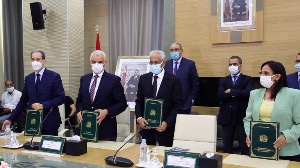Morocco has recently sanctioned a new guide on dealing with hunger strikes inside prison institutions, which is reportedly the first of its kind in Africa and the Arab world.
The guide was approved and signed by prominent officials, namely Mohamed Salah Tamek (General Delegate for Prison and Reintegration Administration – DGAPR), Khalid Aït Taleb (Minister of Health), Amina Bouayach (President of the Moroccan National Human Rights Council – OMDH), and El Hassan Daki (General Prosecutor at the Court of Cassation).
For his part, Head of the DGAPR Health Care Department, Taoufik Abtal, stated that this guide is “the first of its kind in Africa and the Arab world”, stressing that the latter complies with the International Standards in force, as well as the Malta Declaration.
“This guide shall serve as a reference in dealing with hunger strikes, in a way that complies with the national and international laws in force”, Abtal declared in his statement to AlYaoum24 newspaper, noting that all parties are working together for the guide to be implemented accordingly.
+ Hunger strikes represent a form of protest expressed by detainees +
Within the same context, President of the Moroccan National Human Rights Council, Amina Bouayach, called all parties involved to approach the guide carefully, for it tends to find the right formula for preserving lives while deliberately dealing with potential hunger strikes.
“Hunger strikes represent a form of protest expressed by detainees to highlight the circumstances under which they are being held, which can also be used as a political joker card to support certain claims”, Bouayach stated in a press release on the sidelines of the signing ceremony.
“Dealing with hunger strikes can be quite challenging”, Bouayach pointed, noting that the National Council for Human Rights has been intervening tirelessly to stop hunger strikes from occurring ever since 2019.
“The new guide shall enable all of the concerned institutions to intervene whenever a hunger strike takes place, in order to provide the necessary treatment and care to all detainees”, Bouayach stressed, “for the main objective of this guide is to protect the right to life”, she added.
“Thanks to this guide, all of the concerned institutions shall be able to play their roles in respect to the right to life and bodily integrity”, Bouayach declared, claiming that the number of protests inside Morocco’s prison institutions must be in the hundreds.
In her response to whether this guide is likely to restrict the detainees’ right to resort to hunger strikes as a means of protest, Bouayach stated that everyone preserves the right to a hunger strike as long as the latter is safe and unlikely to end one’s life, for it is the OMDH duty to defend the right to life, therefore, it is required to intervene when death “sits in the corner”.
It is noteworthy that the guide on dealing with hunger strikes inside prison institutions stipulates a series of measures to be adopted when trying to save a detainee’s life following a hunger strike.


